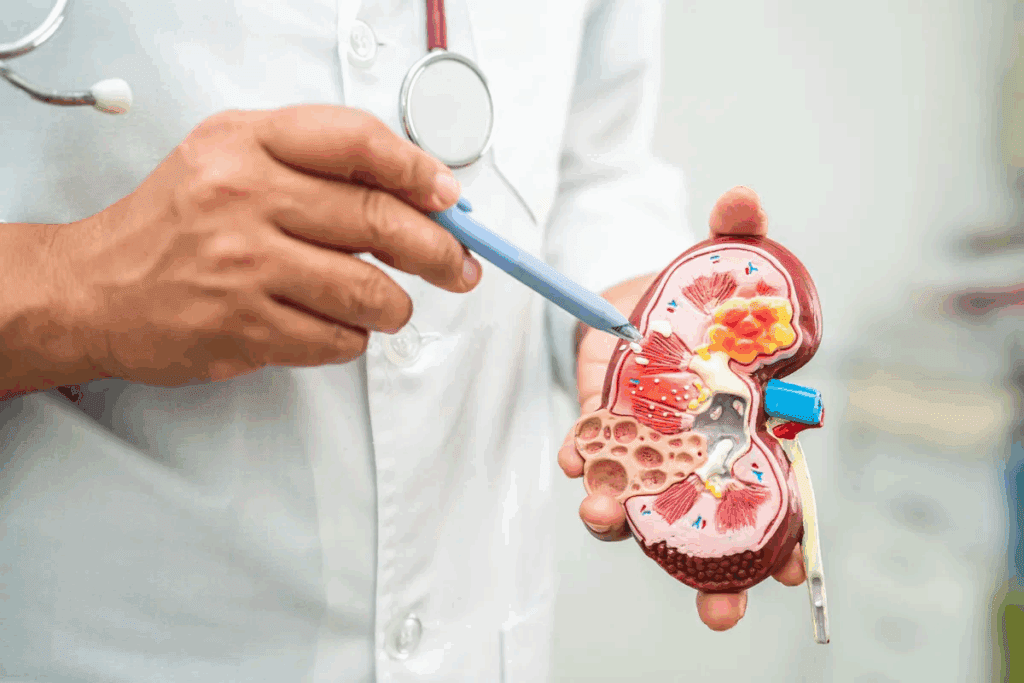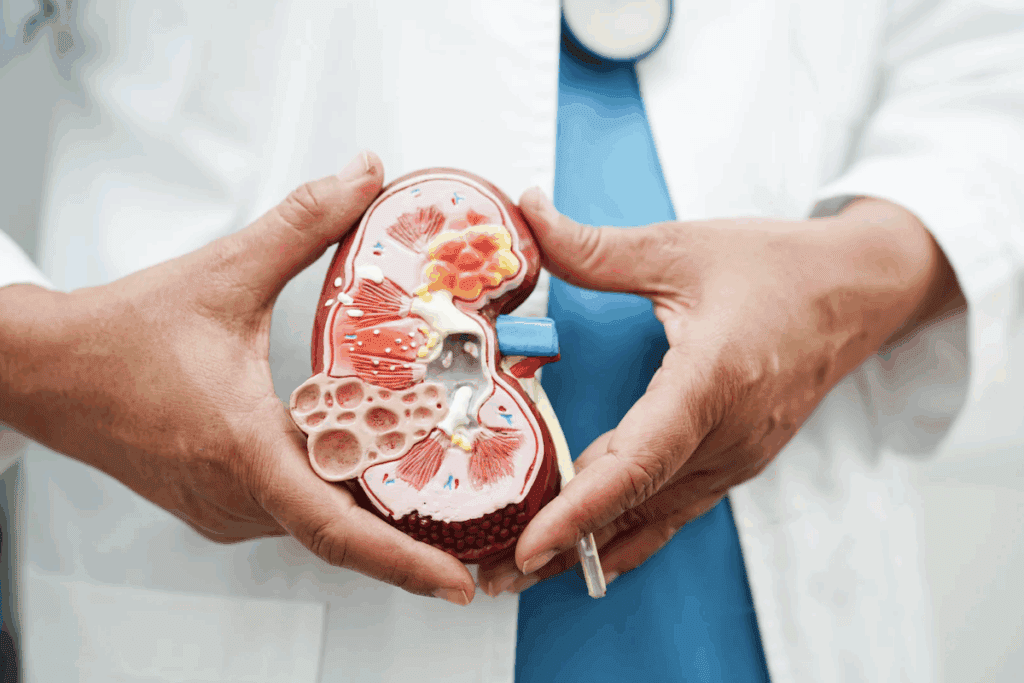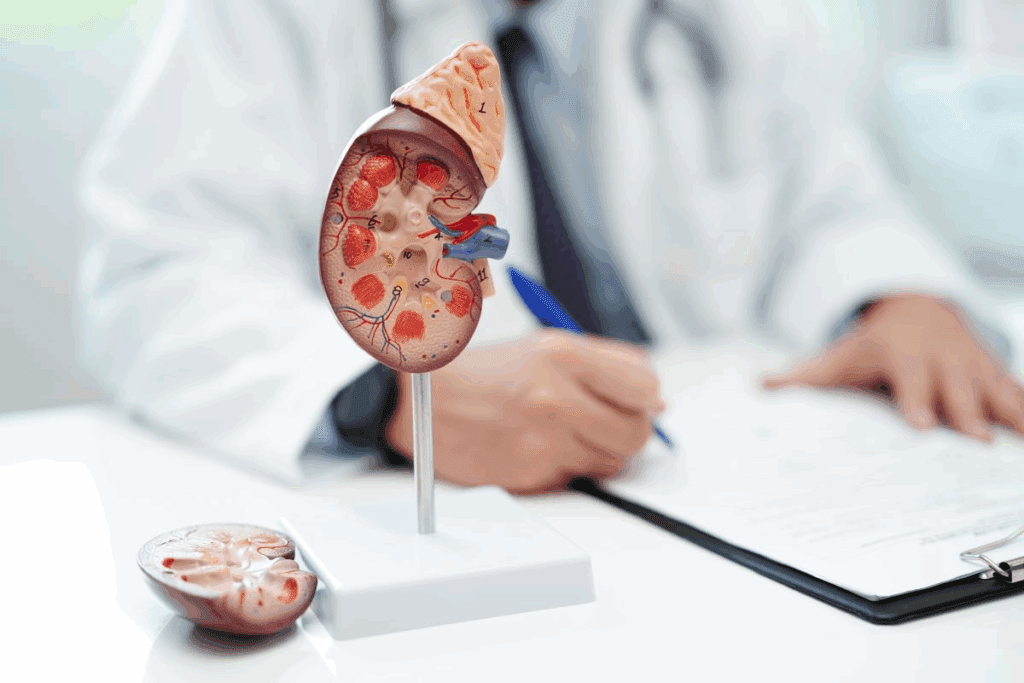Last Updated on October 31, 2025 by Bilal Hasdemir

Kidney stones are a common health issue that can lead to serious complications if left untreated. Nearly 1 in 10 individuals will experience kidney stones in their lifetime, making timely treatment very important. If left untreated, kidney stones can cause prolonged severe pain, urinary tract infections, and permanent kidney damage what happens if a kidney stone goes untreated.
At Liv Hospital, we understand the risks of untreated kidney stones. Our expertise and patient-centered approach help prevent serious complications. We guide patients toward the best medical outcomes. Untreated kidney stones can lead to life-threatening emergencies, showing the need for prompt medical attention.

To understand the risks of not treating kidney stones, we need to know what they are and how they form. Kidney stones are hard, pebble-like deposits in the kidneys. They form when minerals in the urine become too concentrated.
Kidney stones form when the urine’s mineral balance is off. This leads to the formation of crystals from minerals like calcium and oxalate. Dehydration, diet, and genetics play big roles in their formation. The process starts when minerals in the urine become too concentrated, causing them to turn into crystals.
These crystals then grow into stones. The type of stone depends on the minerals in the urine. For example, calcium oxalate stones are common, linked to diet and metabolic issues.
The symptoms of kidney stones vary based on the stone’s size and location. Common symptoms include severe pain in the back or side. This pain can spread to the lower abdomen or groin, known as renal colic.
Other symptoms include:
A medical expert notes, “The pain from kidney stones is very severe. It’s one of the worst pains people can experience.”
Kidney stones are a big health problem in the United States. They affect about 11% of men and 6% of women at some point. The number of cases has gone up over the years, due to changes in diet and lifestyle.
A study found that about 50% of people get another stone within 5 to 10 years if they don’t take preventive steps. Knowing these numbers shows how important it is to be aware and take preventive actions.

The journey of an untreated kidney stone is influenced by several factors, including its size and location. Understanding these factors can help patients and healthcare providers make informed decisions about treatment.
Some kidney stones can pass out of the body on their own without any medical intervention. This process is known as spontaneous passage. The likelihood of spontaneous passage depends largely on the size of the stone.
Size Matters: Stones that are smaller than 5 mm in diameter have a high chance of passing spontaneously, while those larger than 10 mm are less likely to pass on their own.
Several factors influence whether a kidney stone will pass spontaneously. These include:
The timeframe for a kidney stone to pass can vary significantly. While some stones may pass within a few days, others may take several weeks or even months.
| Stone Size | Average Time to Pass |
| Less than 2 mm | 8-14 days |
| 2-4 mm | 12-22 days |
| 4-6 mm | 22-31 days |
It’s essential for patients with untreated kidney stones to stay hydrated and monitor their symptoms closely. If severe pain or other concerning symptoms develop, seeking medical attention is critical.
Not treating kidney stones can lead to serious problems. These include severe pain and issues with urination. Untreated stones can harm the urinary system and overall health.
Persistent and severe pain is a common issue with untreated kidney stones. This pain can feel like a dull ache or a sharp stab. It often starts in the flank and moves to the lower abdomen or groin.
The pain’s intensity depends on the stone’s size and where it is. Larger stones or those in the ureter cause more pain. This pain can be so bad that it disrupts daily life and sleep.
Untreated kidney stones also lead to urinary symptoms. These include needing to urinate often, feeling a burning sensation, and seeing blood in the urine. This makes the urine appear pink, red, or brown.
Some people may feel like their bladder isn’t emptying fully or have trouble starting to urinate. This happens because the stone blocks urine flow, causing irritation and inflammation in the urinary tract.
Kidney stones can greatly affect daily life. The pain and urinary symptoms make it hard to do everyday tasks. They also limit work productivity and social activities.
These issues can also harm mental health, causing stress, anxiety, and sometimes depression. It’s important to treat kidney stones quickly to avoid these problems and improve quality of life.
Untreated kidney stones can lead to serious complications over time. It’s important for patients to know the timeline of these issues. This knowledge helps them seek medical help quickly.
In the first days to weeks, patients often face severe pain and urinary issues. These include urgency, frequency, and discomfort. Such symptoms can really disrupt daily life.
Without treatment for one to three months, complications grow. Patients might get urinary tract infections (UTIs) because of the stone. These infections can lead to sepsis, a serious condition.
Key risks during this period include:
After three months, untreated kidney stones can cause severe damage. Chronic obstruction can lead to hydronephrosis, where urine backs up into the kidney. This can damage the kidney and even lead to kidney failure.
The long-term effects include:
In conclusion, the timeline of complications from untreated kidney stones is alarming. It shows why getting medical help quickly is so important. By knowing the risks, patients can make better choices for their health.
Untreated kidney stones can cause serious problems in the urinary tract. They can lead to infections and long-term damage. When stones block urine flow, they create a perfect spot for bacteria to grow.
One major issue with untreated kidney stones is urinary tract infections (UTIs). UTIs happen when bacteria grow in the urinary tract, often because of the stone blockage. Symptoms include painful urination, frequent urination, and abdominal discomfort.
If not treated, UTIs can move up to the kidneys. This can lead to more serious infections like pyelonephritis.
People with untreated kidney stones often face recurring UTIs. Treating these infections with antibiotics can lead to antibiotic resistance. This makes it harder to fight off infections in the future.
We need to think about how untreated kidney stones affect antibiotic resistance.
Long-term blockage and infection can cause inflammation and scarring in the urinary tract. This scarring can lead to serious damage, like chronic kidney disease. It shows why treating kidney stones quickly is so important.
Not treating kidney stones can harm your kidneys badly. Kidney stones can block urine flow, causing many problems. These issues can hurt how well your kidneys work.
Hydronephrosis is a big risk with untreated kidney stones. It happens when urine flows back into the kidney because of a blockage. This can make the kidney swell and get damaged if not treated quickly.
Hydronephrosis can cause severe pain. It can also hurt your kidney’s function over time.
A kidney stone can block the urinary tract and damage your kidneys. The longer it stays, the more damage it can cause. This damage comes from the high pressure in the kidney from the backed-up urine.
A stone stuck in the ureter for months can harm your kidney for a long time. The blockage can cause scarring and fibrosis. This can lead to a big drop in kidney function or even kidney failure if not treated.
It’s very important to see a doctor if symptoms get worse or don’t go away. Early treatment can prevent long-term damage and keep your kidneys working well.
It’s important to know the risks of untreated kidney stones. They can lead to serious problems if not treated. Kidney stones are often seen as a painful but manageable issue. But, they can cause severe problems if ignored.
Untreated kidney stones can cause sepsis, a serious condition. Sepsis is a medical emergency that needs immediate care. A kidney stone can block the urinary tract, leading to infection. This infection can spread to the blood and cause sepsis.
Kidney stones can also cause kidney failure. Kidney failure happens when the kidneys can’t filter waste from the blood. This can be due to prolonged blockage or repeated infections. A stone can damage the kidney tissue, leading to chronic disease or acute injury.
Though rare, death can occur from untreated kidney stones. These cases often involve severe infections or kidney failure. Seeking medical care is key if symptoms don’t improve or get worse.
| Complication | Description | Potential Outcome |
| Sepsis | Life-threatening condition caused by the body’s response to an infection | Multi-organ failure, death |
| Kidney Failure | Loss of kidney function due to prolonged obstruction or infection | Chronic kidney disease, need for dialysis or transplant |
| Urinary Tract Infection (UTI) | Infection in the urinary tract, potentially leading to sepsis | Sepsis, kidney damage |
In conclusion, kidney stones are not usually fatal if treated quickly. But, they can cause serious problems if ignored. It’s vital for those with symptoms to get medical help to avoid these dangers.
Untreated kidney stones can be very dangerous for some people. Certain health conditions, age, and having one kidney can make things worse. These factors can lead to serious complications.
People with certain health issues face a higher risk. Conditions like diabetes, heart disease, and kidney disease can make things harder. For example, diabetes can hurt kidney function and raise the chance of infections.
Heart disease can also make some treatments risky. Conditions that weaken the immune system, like HIV/AIDS or chemotherapy, can make fighting off infections harder.
Age is a big factor in kidney stone risks. Older adults face more challenges because of weaker kidneys and possible health issues. They might also have a single kidney or less kidney function.
Children have their own set of problems. They might have stones due to genetic or metabolic conditions. This makes treatment more complicated.
People with one kidney are at a higher risk. A stone can block urine flow, causing severe pain and infection. It can even damage the kidney.
Not treating the stone quickly can lead to serious problems. This includes sepsis or kidney failure, which can be deadly. So, if you think you have a kidney stone, get medical help right away.
Knowing when to get emergency care for kidney stones is key. Kidney stones can cause a lot of pain and serious problems if not treated fast.
Some symptoms mean your kidney stone is serious and needs quick medical help. These include:
If you see any of these signs, get emergency care right away to avoid more problems.
Some symptoms show your kidney stone has caused big problems, like infection or kidney damage. These signs are:
| Symptom | Possible Complication |
| Fever above 101.5°F (38.6°C) | Infection (sepsis) |
| Persistent nausea and vomiting | Dehydration, electrolyte imbalance |
| Severe flank pain radiating to the groin | Stone obstruction, kidney damage |
Spotting these symptoms early can save your life. If you’re showing any of these, get to emergency care fast.
When you go to emergency care, tell them everything about your situation. Be ready to talk about:
Telling them all you can helps doctors figure out what to do and how to help you.
Can u die from kidney stones? Yes, though it’s rare, death can happen from untreated kidney stones. This is usually because of severe infection (sepsis) or kidney failure. Quick medical help can stop these deadly outcomes.
Getting treatment for kidney stones quickly is key to avoid serious problems. Untreated stones can cause a lot of pain, infections, and even harm the kidneys. In bad cases, it can even lead to death from complications like sepsis or kidney failure.
It’s very important to get help fast. Quick medical care can stop the pain, prevent long-term damage, and lower the risk of death. The treatment depends on the stone’s size, location, and the patient’s health.
If you think you have kidney stones, see a doctor right away. Early treatment can greatly improve your chances of a good outcome. Knowing the dangers of not treating stones and the benefits of quick treatment helps patients make better choices.
In short, treating kidney stones quickly is vital to avoid serious and even life-threatening issues. If you’re showing symptoms, talk to a healthcare expert to find the best treatment.
Untreated kidney stones can cause severe pain and urinary symptoms. They can also lead to serious complications like urinary tract infections and kidney damage. In extreme cases, they can even be fatal.
Yes, in rare cases, a kidney stone can be fatal. This can happen if it causes a severe condition like sepsis or kidney failure.
Not passing a kidney stone can lead to prolonged pain and urinary symptoms. It also increases the risk of serious complications. These can include urinary tract infections, kidney damage, and even life-threatening conditions.
A kidney stone can stay in the ureter for a few days to several months. This depends on its size and location.
Symptoms that need immediate medical attention include severe pain and difficulty urinating. Also, blood in the urine, fever, and chills are warning signs.
Yes, untreated kidney stones can cause long-term damage. This includes scarring, recurring infections, and potentially kidney failure.
Yes, people with pre-existing medical conditions are more at risk. This includes those with diabetes or kidney disease.
Yes, a stone stuck in the ureter for months can cause permanent damage. This includes progressive kidney damage and hydronephrosis, leading to long-term consequences.
Warning signs of sepsis from a kidney stone include fever and chills. Also, rapid heart rate and confusion are signs that need immediate medical attention.
Yes, older adults are more vulnerable to complications from untreated kidney stones. This includes fatal outcomes due to age-related vulnerabilities and underlying medical conditions.
Subscribe to our e-newsletter to stay informed about the latest innovations in the world of health and exclusive offers!
WhatsApp us